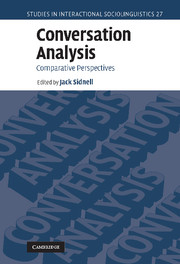Book contents
- Frontmatter
- Contents
- List of figures
- List of tables
- List of contributors
- Transcription conventions
- Part I Introduction
- Part II Repair and beyond
- Part III Aspects of response
- 5 Projecting nonalignment in conversation
- 6 Two answers to inapposite inquiries
- 7 Gaze, questioning, and culture
- 8 Negotiating boundaries in talk
- Part IV Action formation and sequencing
- Part V Conclusion
- Bibliography
- Index
6 - Two answers to inapposite inquiries
Published online by Cambridge University Press: 15 December 2009
- Frontmatter
- Contents
- List of figures
- List of tables
- List of contributors
- Transcription conventions
- Part I Introduction
- Part II Repair and beyond
- Part III Aspects of response
- 5 Projecting nonalignment in conversation
- 6 Two answers to inapposite inquiries
- 7 Gaze, questioning, and culture
- 8 Negotiating boundaries in talk
- Part IV Action formation and sequencing
- Part V Conclusion
- Bibliography
- Index
Summary
Introduction
In recent years, one major focus of conversation analysis (CA) has been to investigate how knowledge is distributed and negotiated among participants in interaction. Research has demonstrated that for conversationalists what each of them knows and how they know it are accountable matters (Heritage 1984a, 1998; Drew 1991; Schegloff 1996b; Roth 2002; Heritage and Raymond 2005; Raymond and Heritage 2006; Stivers 2005; Clift 2006a, 2006b; Golato and Fagyal 2008). As is the case for most CA research, the majority of these studies have been based on the analysis of English data. However, as Schegloff (2006) argues, human beings as a species face the same problems and issues in everyday life independently of language or culture. As “the primary, fundamental embodiment of sociality” (Schegloff 2006: 70), interaction is designed to address these problems and issues, though the way in which this gets done varies across languages or cultures (cf. Schegloff 2002a). It thus stands to reason that practices parallel or analogous to those described for English exist in other languages. Once identified, such practices may provide a basis for cross-linguistic comparison – allowing us to see the way in which the local resources of a particular language are mobilized to solve generic problems of interaction.
In this chapter, I explore how Danish speakers orient to knowledge in interaction. Specifically, I identify two Danish practices, through which a recipient can index that a question is inapposite, because it inquires into something that should already be known to the questioner, and compare these with one previously described for English.
- Type
- Chapter
- Information
- Conversation AnalysisComparative Perspectives, pp. 159 - 186Publisher: Cambridge University PressPrint publication year: 2009
- 35
- Cited by

